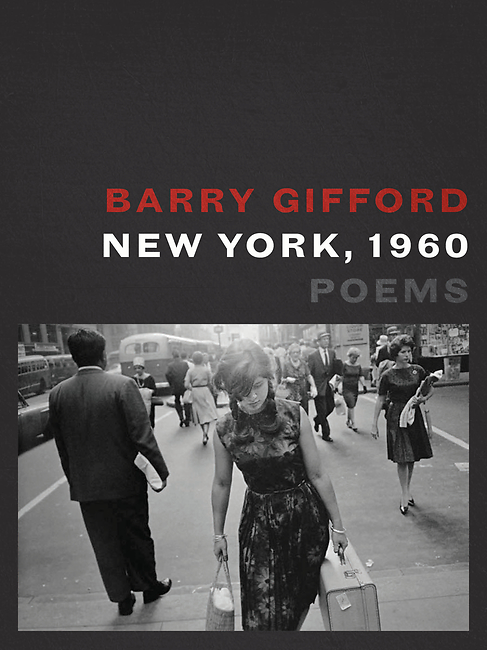
New York, 1960
by Barry Gifford
Barry Gifford's newest collection of poetry captures the disarray of a life lived with passion, and in many places. In his signature laconic style, Gifford ponders serendipitous acquaintances, mourns the deaths of old friends and squandered relationships, and writes light and love-filled notes to his daughter and granddaughter. An evocative collection from an enduring voice.
PRAISE:
"It's like this: It's late at night, or very early in the morning, and you're walking down an empty street, and everything is utterly still and silent; and then you pass by an apartment building and someone on the third floor has a window open, and you hear some music playing, very softly. The music bounces off the walls of the buildings and you can make out the tune, pure and intimate and playing just for you. And that's what you get with Barry Gifford's poetry. It's direct, tender, wry, and heartbreaking."
—Rob Christopher, Chicagoist
"Like Minerva Jones, the village poet in Edgar Lee Masters’ 1916 Spoon River Anthology, all-around writer Barry Gifford croons out these poem-prose reflections in a well-distilled voice that booms and whispers with life. Consider the beauty of aging women, including his own dying mother or the Andy Warhol film-cult star Ultra Violet. Consider loss and loss and Greenwich Village, ancient China’s poet Li Po, fellow Chicagoan Nelson Algren (whose Walk on the Wild Side precedes Lou Reed’s), baseball, the making of a proper dry martini, Beat-flowered Zen, screenwriting as key to worldwide travel. Consider romance, the constant demand and craziness of love, children, grandchildren, the social over-wash of adoption, the glory of creative life lived out. Picture a table fragrant with food and drink. Across from you, some character straight out of William Saroyan’s The Time of Your Life, sits telling you stories. At comfortable, even-pitched Frank Sinatra level, he leans in to speak or chant of Sumatra’s tigers and orangutans, sighing, uttering: “Here in San Francisco techies jaywalk / talking on cellphones / women windowshop on Hayes Street / sipping gigantic takeout lattes / drivers weave through traffic / while texting / homeless people sleep on sidewalks” – and you get it. What connects New York, 1960 to post-War 1916 USA and Barry Gifford’s 21st century is the measure of his lyric, narrative breath.
—Al Young, California's former poet laureate
“Barry Gifford’s pure lyrical self shines in these poems.”
—Andrei Codrescu
“[Gifford’s] poems remind me of Frank O’Hara’s phrase ‘feminine, marvelous, and tough.’”
—David Bromige
“These poems are like Zen dominoes: no matter how shuffled, they always seem to come out right.”
—Booklist
“Barry Gifford is an American Original.”
—Richard Price
“Gifford has invented his own American vernacular.”
—Jonathan Lethem
“The experience of reading Gifford is like starting a car and realizing, too late, that someone has cut its brake lines.”
—Nathaniel Rich, New York Review of Books
“There’s no one like Barry Gifford, which is the best reason to read him. . . . His writing is like a lightning rod discharging all the shocking energies of our society.”
—Richard Dyer, Boston Globe
“At his best, Gifford recalls William Carlos Williams: particular, lyrical but laconic, compassionate but unsentimental.”
—Publishers Weekly
“Barry Gifford’s new poems blaze with life, love and devastating candor, and his selections from previous books reveal a delicacy of feeling and reverence for life that fans of his novels will find deliciously surprising.”
—Lee Chapman, First Intensity
“Gifford never fails to illuminate what Jack Kerouac called the ‘jewel center of interest,’ the arresting image or moment in time that invites the reader to become part of it.”
—John Hicks, New Orleans Review
"Gifford sketches marvelous characters as deftly as William Faulkner and animates them in scene after scene of hilarious dialogue … Barry Gifford continues to be one of America's most original writers."
—Playboy
"Gifford’s admirers can’t be faulted for imprecision. He’s a moving target, as omnivorous as he is prolific, having published poetry, novels, story collections, memoirs, biographies of William Saroyan and Jack Kerouac, art criticism, plays, screenplays, a libretto, and nonfiction monographs about horse racing and the Chicago Cubs. Even this kind of classification is inaccurate: his history of the Cubs is really a memoir, his poems read like prose, his prose like poetry."
—New York Times Book Review
ABOUT BARRY GIFFORD:
Barry Gifford is the author of more than 40 books, which have been published in twenty-eight languages. His work has been awarded by PEN, the NEA, the Los Angeles Times, and the New York Times. His film credits include Wild at Heart, Lost Highway, City of Ghosts and more.
PUBLICATION DETAILS:
Pages: 98
ISBN: 978-1940430775
Publication Date: June 2016

